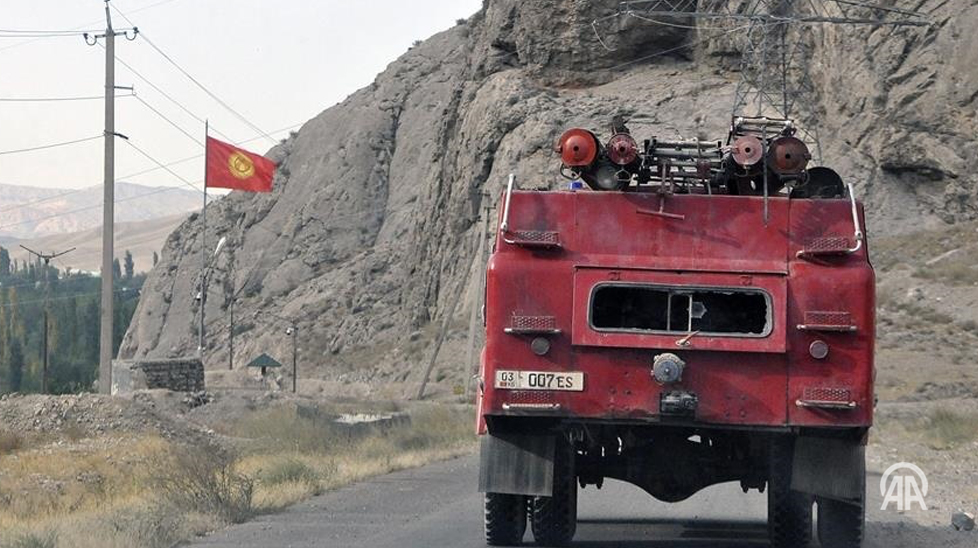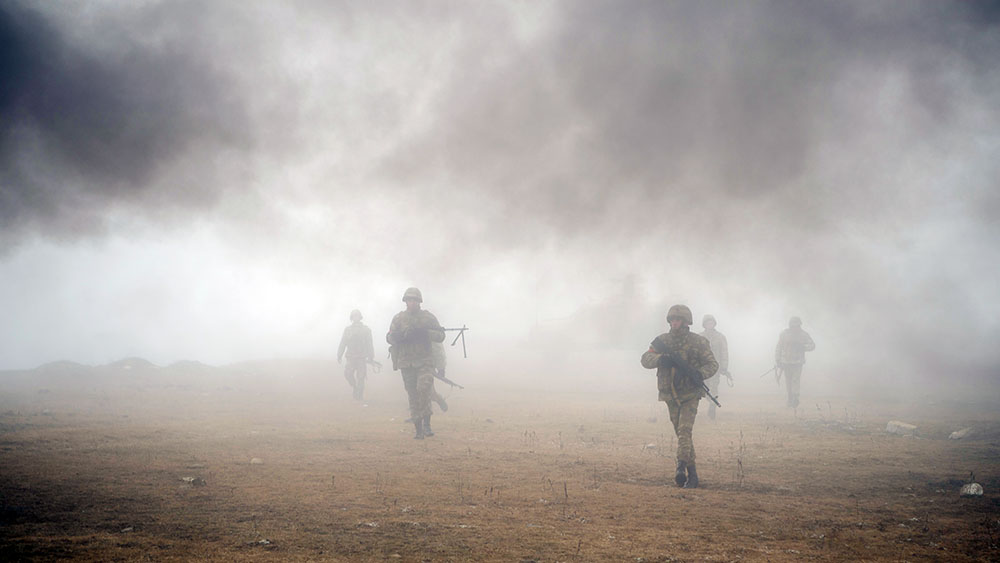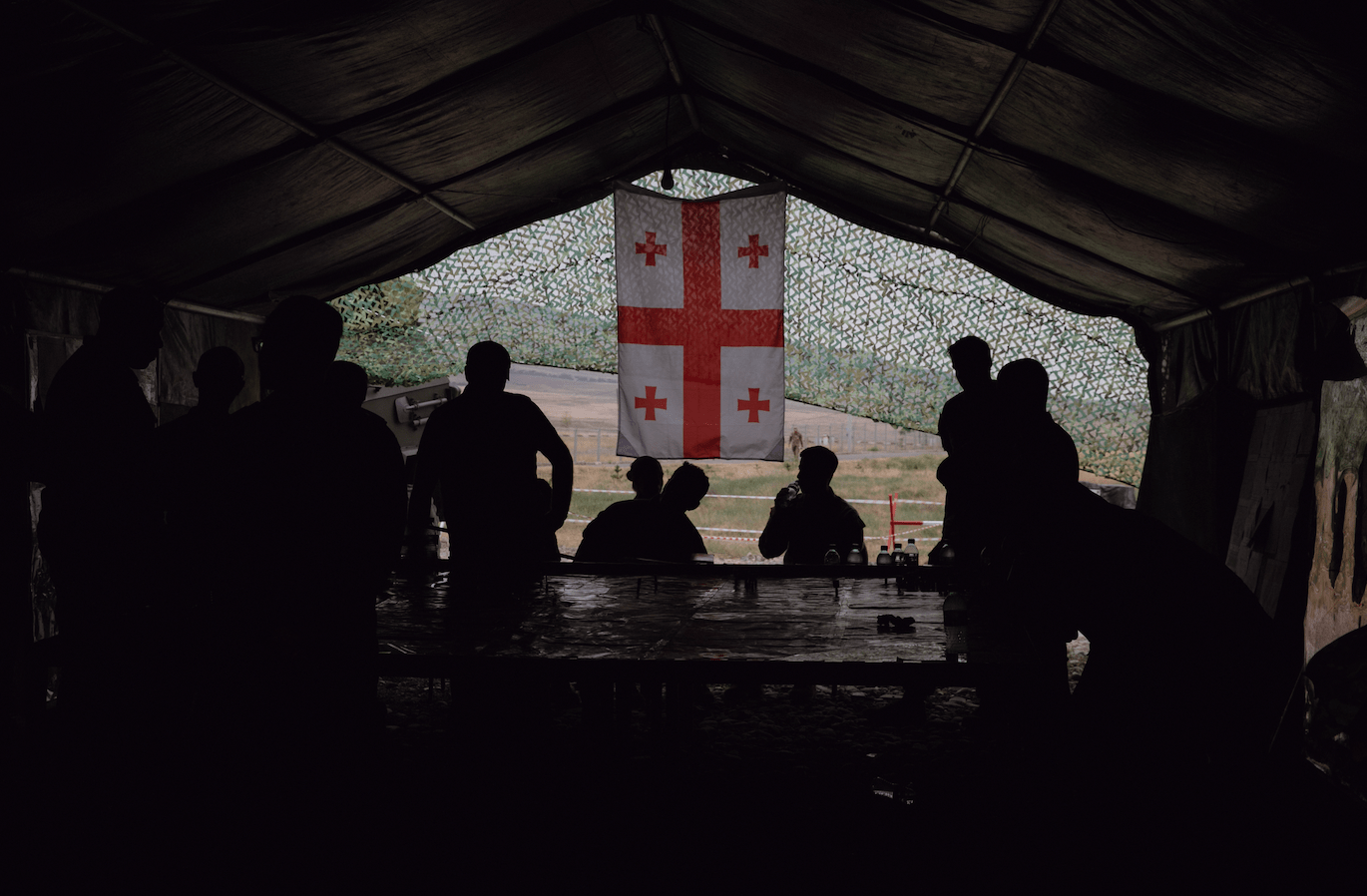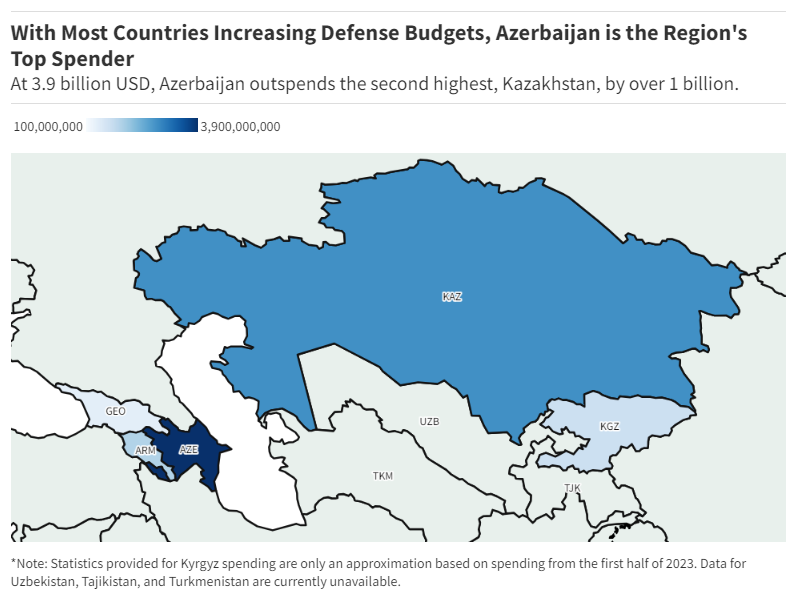A Delicate Balancing Act: Navigating Conflicts and Diplomacy: 2023 in Review
Recent Articles
Author: Toghrul Ali, Josephine Freund, Haley Nelson, Nicholas Castillo
12/21/2023
Great power influence is still present, but noticeably waning. The region has taken notable steps to diversify political and economic relationships, particularly with the West and even with some Gulf region countries.
Since Russia’s invasion of Ukraine began in February 2022, the Caspian Region has been given strong incentives to loosen the Kremlin’s grip. The floundering Russian economy, significant economic opportunities from the West, and an encroaching economic threat from China’s debt-trap diplomacy, paired with Russia’s expansionist ambitions, have made it a policy priority for many Caspian states to reduce the influence of their neighboring great powers. But, at the same time, the region is aware of its limitations with the Kremlin. To avoid confrontation with Russia, in 2023, the Caspian region quietly began to dismantle its one-sided partnership with the Kremlin; a move that, if successful, can help stabilize regional security.
But, this wasn’t met without resistance. This past year, Russia attempted to maintain its waning influence in the region primarily via the Collective Security Treaty Organization (CSTO), which includes Armenia, Belarus, Kazakhstan, Kyrgyzstan, and Tajikistan as its members. Russia's focus on Ukraine has resulted in heightened regional collaboration, with states looking to build up their defense capabilities. Another growing trend has been enhanced security cooperation among Caspian states and external players such as China, Turkey, France, India, and the United States.
The Tajikistan-Kyrgyzstan Conflict
 Source: Anadolu Agency
Source: Anadolu Agency
Throughout the year, Tajikistan reported multiple instances of fighters crossing the border into Tajikistan, though the exact facts of these incidents are murky. But the re-appearance of the controversy surrounding the Kyrgyz-Tajik border officially began on September 15, when the head of Kyrgyzstan’s State Security Committee, Chairman Kamchybek Tashiyev, claimed to have uncovered documented proof of Tajik aggression against Kyrgyzstan. But, as quickly as the conflict started, it came to an end.
On October 2, Kyrgyzstan and Tajikistan signed a surprise protocol that took a significant step toward resolving the long-standing border dispute. Kyrgyz security chief Kamchybek Tashiyev claimed that the document “gives us the basis to resolve all border issues.” While the lack of details surrounding the agreement has caused speculation, it is clear that both Tajikistan and Kyrgyzstan, at the very least, wish to offer the impression that serious progress is being made on the border issue.
The border agreement signals yet another sign of declining Russian influence in the post-Soviet space and the increasing self-interest and self-awareness of the region. One of the major takeaways from recent events in the long-running conflict between Tajikistan and Kyrgyzstan has been near-complete inaction on the part of Moscow. In a region long considered Russia’s “backyard,” Tajik and Kyrgyz leadership have made significant progress on a central security issue without any involvement by Russia.
In theory, Tajikistan and Kyrgyzstan are allies, both members of the Collective Security Treaty Organization (CSTO), and the organization relies on Russia’s role as a leader, mediator, and security guarantor. However, it is no longer clear whether Russia is willing or able to live up to these roles. Russia’s absence in the Kyrgyz-Tajik mediation process has revealed the CSTO’s lack of cohesion. And rather than resolving regional tension, the organization did nothing as both Bishkek and Dushanbe engaged in a local arms race against one another.
2023 saw the CSTO come under pressure on multiple fronts, and the flaws of the six-country alliance were pushed to the fore. Renewed tensions between Kyrgyzstan and Tajikistan have been added to conflicts in Ukraine and Nagorno-Karabakh as central security issues that the CSTO has failed to address. With a variety of conflicts erupting throughout Central Asia and Eastern Europe, however, the CSTO has begun to fade; exposed as a body incapable of or unwilling to manage the largest security issues for its member states.
The Karabakh Conflict
 Source: Azerbaijan’s Ministry of Defense
Source: Azerbaijan’s Ministry of Defense
While Belarus has openly supported Russia, other CSTO members have been more reserved, if not displaying varying degrees of skepticism or opposition. Armenia refused to host CSTO exercises in January, while also refusing to send its troops for the organization’s drills in March and September. Traditionally, Armenia has received military protection from Russia, through means such as the CSTO. However, now Russia is too preoccupied with its war in Ukraine to adequately intervene on Armenia’s behalf should another round of fighting occur. In fact, on September 29, following deadly border clashes with Azerbaijan, Armenian Prime Minister Nikol Pashinyan hinted at disappointment with Russia, stating that “our allies” have not followed through on numerous contracts that promised to deliver weapons to Armenia. An even more clear snub of Russia, as those CSTO exercises were taking place, Armenia announced it would hold limited military training exercises with American soldiers, the first of its kind. Later that month, Armenia announced it would begin providing Ukraine with humanitarian aid, which has caused further rift in its relations with Russia.
Russia’s war on Ukraine has continued to negatively impact its previously strong hold on Central Asia and the South Caucasus. Russia’s drive to persuade Caspian states back into its sphere of influence is beginning to visibly falter, and the recent symbolic visits from Gazprom representatives throughout Central Asia have had minimal significance. The Kremlin’s attempts to maintain control over Central Asia are being overshadowed by China’s economic sway, and Russia is left to either compete with Beijing’s growing power or find ways to cooperate with it.
Arguably the biggest security development in the Caspian region took place in September 2023 between Armenia and Azerbaijan. After three decades of on-and-off conflict between Armenia and Azerbaijan, relations between the two countries are at a turning point. Despite several high-level meetings between Azerbaijani and Armenian officials throughout the year, tensions remained high and mounted to a full-scale escalation. On September 19, Azerbaijan announced the beginning of "anti-terrorist measures of local character" in Nagorno-Karabakh. The operation lasted only over a day, with the separatist Armenian leadership in Karabakh agreeing to dissolve itself.
Since Azerbaijan retook territory lost during the first Nagorno-Karabakh war in September, Baku has announced the re-integration process of Karabakh and launched a dialogue with the representatives of the Armenian community of Karabakh. However, while the reintegration process so far has produced some success, the demographic situation of the region remains chaotic, with 100,000 Armenians having left Karabakh for Armenia and 600,000 Azerbaijani internally displaced from the First Karabakh war. A broad agreement is yet to be negotiated, as the two states remain at odds over various issues, including border demarcation and transportation links.
With the reincorporation of Karabakh underway and hostilities in the region largely over, both Baku and Yerevan are facing an ambitious opportunity to normalize, which would contribute to stabilizing the South Caucasus. Yet, recent months have seen the process flounder due to different preferences as to how negotiations will go forward, delaying the peace talks. On October 4, Azerbaijan announced that it would not be attending the much-anticipated summit in Grenada, Spain the very next day. Later in October, Armenian Prime Minister Nikol Pashinyan declined to attend the Commonwealth of Independent States summit in Kyrgyzstan, where Russia had hoped to mediate talks between Pashinyan and Azerbaijani President Ilham Aliyev. On October 25, the trilateral meeting between Azerbaijan, Armenia, and the European Union was canceled, with no future date announced.
However, December 7 saw what was likely a breakthrough in negotiations. As a result of bi-lateral discussions held on the border of Azerbaijan and Armenia, the two countries released a joint statement reconfirming their “intention to normalize relations and to reach the peace treaty on the basis of respect for the principles of sovereignty and territorial integrity” and described it as a “historic opportunity.” Furthermore, the statement outlined a series of confidence-boosting measures, including the mutual release of military servicemen held as prisoners and Armenia supporting Azerbaijan’s bid to host the COP 29 climate conference. Based on the statement it seems likely that future negotiations will follow. Even more noteworthy, is the bi-lateral format talks will likely be held going forward, which will boost communication and cooperation between Azerbaijan and Armenia and the regionalization of the politics of the South Caucasus.
While Azerbaijan has continued to build upon its security cooperation with Israel and Türkiye, it has become clear that Armenia views Russia as a passive and unreliable partner, leading Yerevan to look westward for support. In October, France came to an agreement with Armenia to provide military equipment including anti-air missiles, armored vehicles, and weapons. France has been attempting to ramp up its security presence in the region, as the country has also shown interest in providing Kazakhstan and Uzbekistan with the French Dassault Rafale combat aircraft as a replacement for their Russian-made jets. Dependent upon Moscow for most of its trade, Armenia will likely not want to provoke the Kremlin too much, and Armenian officials are already making it clear that Yerevan will not attempt to join NATO and will remain within organizations like the CSTO and Eurasian Economic Union.
Security Threats to Georgia
 Source: U.S. European Command. Credit: Spc. Devin McReynolds
Source: U.S. European Command. Credit: Spc. Devin McReynolds
In Georgia, the security situation remains tense with 20% of its territory still under the occupation of Russian-backed separatists.
On November 6 a Georgian citizen was killed and another detained by Russian forces on the defacto border separating Georgian controlled territory from the separatist South Ossetia region. It was the first fatality caused by the conflict, which began in the 1990s immediately following the dissolution of the USSR, since the 2008 Russo-Georgian war. The killing was condemned by both European Union and Georgian officials, who stated it represented the cost of the continued occupation of Georgian territory. The release of the Georgian citizen who had been detained by Russian forces was announced by the Georgian government on December 5.
Between Augusts 22 and September 1, Georgia participated in the Angel Spirit 23 military exercises alongside NATO members and allied states. The goal of the biennial exercises is to improve the “collaboration and interoperability” between allied forces. The exercises took place in Türkiye and Georgia and involved approximately 3,600 military personal from 21 countries, including Georgia’s neighbors Türkiye and Azerbaijan. The United States and Georgia were by far the main participants, with 1,200 and 1,900 personal taking part in the exercises respectively.
Georgia continued to deepen military cooperation with Türkiye and Azerbaijan from October 3 to October 7 as part of the computer assisted command staff exercises titled “Eternity 2023.” These exercises, which also aimed at interoperability, consisted of military scenarios some of which were executed practically and some of which were executed theoretically. Going into 2024, it looks as if Georgia will continue to deepen cooperation with Azerbaijan and Türkiye, holding tri-lateral meetings between their Defense Ministers on November 28 where the three countries signed a protocol on future joint-drills in 2024 as well as a military cooperation agreement.
 Credit: Nicholas Castillo
Credit: Nicholas Castillo
On October 5, Russia signed an agreement with the so-called Republic of Abkhazia to build a permanent naval base in the Russian-occupied region of Georgia. On October 4, the Institute for the Study of War released satellite images showing that “The Russian military recently transferred several Black Sea Fleet (BSF) vessels” from the Crimean port of Sevastopol to Russia’s Novorossiysk port, “likely in an effort to protect them from continued Ukrainian strikes on Russian assets.” An estimated 17 Russian naval vessels have relocated from Sevastopol, moving closer towards the Black Sea’s Eastern shores.
A permanent Russian naval base in Abkhazia could transform the region into an additional front, or a maneuverable reserve, for Russia’s offensive against Ukraine, potentially dragging the conflict down into Georgia. Not only would an Abkhazian naval base provide Russia with the opportunity to launch attacks from Georgia’s coastline, but it also increases Georgia’s risk of becoming a target for anti-Russia attacks.
The war in Ukraine is continuing to place pressure on Georgia. Ignited fears of Russian occupation and spill-over from the Ukraine war in the Black Sea has increased tensions in the Caucasus and made its partnerships with the West even more important.
Azerbaijan-Iran
2023 relations between Azerbaijan and Iran had a rocky start: On January 27 a gunman entered the Embassy of Azerbaijan in Tehran, Iran, armed with a Kalashnikov assault rifle. The attacker shot at embassy staff, resulting in the death of the head of security, as well as injuries to other staff members.
In a call with Azerbaijani Foreign Minister Jeyhun Bayramov, Iranian Foreign Minister Hossein Ami-Abdollahian that he hoped that this attack would not hurt bilateral ties between the two countries. But his statement rings hollow, because this attack did not occur in a vacuum: Azerbaijan’s Ministry of Foreign Affairs emphasized that it is part of a growing “anti-Azerbaijan campaign” that has been gaining traction in Iran. And it’s worth noting that this was not the first attack with ties to the Iranian government on an Azerbaijani embassy in the past year. Further adding to the tensions, on March 11, Azerbaijan summoned its Iranian Ambassador to Baku after an Iranian warplane flew close to, as well as crossed over, the Iranian-Azerbaijani border, between the regions of Bilasuvar and Zangilan, allegedly encroaching on Azerbaijani airspace. Just a month later, on April 6, Azerbaijan expelled four Iranian diplomats due to “four employees of the Iranian Embassy were declared persona non grata by the Azerbaijani government due to activities incompatible with their diplomatic status and that contradict the 1961 Vienna Convention on Diplomatic Relations; those persons were ordered to leave the territory of Azerbaijan within 48 hours.” Nevertheless, Iran initiated the path toward reconciliation when its Foreign Minister Amir-Abdollahian visited Azerbaijan in September to attend a ministerial meeting of the Non-Aligned Movement. Displaying a conciliatory stance during the visit, Amir-Abbdolahian emphasized Iran’s interest in working with Azerbaijan on regional projects, namely the “Aras corridor” linking Azerbaijan with Nakhchivan via Iranian territory. In this line, on October 6, Azerbaijani Deputy Prime Minister Shahin Mustafayev and Iranian Minister of Roads and Urban Development Mehrdad Bazrpash laid the foundation for the construction of a highway bridge, in Azerbaijan’s Zangilan district. The bridge is expected to be a part of the Aras corridor, a 55-kilometer highway and railway route through Iran, and an alternative to the Zangezur corridor. Despite the rapprochement between Iran and Azerbaijan creating an environment for peace efforts and pragmatism in the region, the easing of relations should be seen within its context. Geopolitical competition between Iran and Türkiye, as well as Israeli relations with Azerbaijan is likely to maintain the mistrust among sides in South Caucasus.
In stark contrast with shaky Azerbaijan-Iran relations, Azerbaijan and Israel nurtured their own growing bilateral partnership, much to Iran’s contempt. On January 11, Azerbaijan appointed its first Ambassador to Israel, Muhtar Mammadov, after announcing on November 18 that it would open an embassy in Tel Aviv. The opening of the embassy led to a sharp increase in bilateral cooperation between the two countries. On May 30, Israeli President Isaac Herzog visited Baku. Not only did Herzog and Aliyev discuss increasing cooperation in cybersecurity, defense, energy, and desalinization, but both leaders stressed the growing security threat Iran posed. Then, on September 6, Assistant to the President of Azerbaijan and Azerbaijan’s Head of the Department of Foreign Policy Affairs of the Presidential Administration, Hikmet Hajiyev, met with Israeli officials in Tel Aviv. Their talks focused on enhancing Azerbaijani-Israeli relations and recognizing the historical bonds between Azerbaijani and Jewish people. On August 17, Prime Minister of Georgia Irakli Garibashvili made a similar visit to Tel Aviv with the stated aim of increasing bilateral economic cooperation and working toward a joint free trade agreement. Finally, as a further show of increased cooperation between Israel and Azerbaijan, on July 17, the UK’s BP (British Petroleum) and State Oil Company of the Azerbaijan Republic (SOCAR) for the first time placed a joint bid with Israel's NewMed Energy in a licensing round for Israeli hydrocarbon exploration.